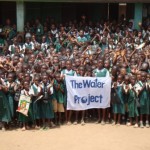The report below from our partner in the field gives some great information on the construction of new latrines at Kilanyi Muslim Primary School in Uganda. This school already has a source of safe, clean water. The aim of this project is to provide latrines for the school's use and training in proper sanitation and hygiene.
Introduction
Article (30) of the Constitution of the Republic of Uganda provides for education of Ugandan children as a human right. Masindi District local government in collaboration with The Water Trust has been implementing a school sanitation and hygiene program through provision of access to clean and safe water at both schools and communities, initiation and training of school health clubs and construction of latrines at selected schools as part of its efforts to ensure that quality education for boys and girls becomes a reality.
The introduction of Universal Primary Education or UPE (commonly known as free education for all) resulted in a rapid increase in the number of children in the primary schools from 5.3 million in 1997 to 7.3 million in2002; a trend that has continued in subsequent years, straining hygiene and sanitation facilities in schools, with consequent low standards of sanitation and hygiene in many primary schools all over the country. Masindi district schools and specifically Kilanyi Muslim Primary School are not any unique. With an enrollment of 322 pupils of which 164 are boys and 165 girls, the school shares the same latrine with both pupils and teachers and the state of this facility is very dirty.
Sanitation facilities prevent the transmission of diseases as it prevents human faecal contamination of water and soil. The lack of proper sanitation facilities are the cause for a significant proportion of the world’s infectious disease burden. According to the WHO, diseases due to poor water supply, sanitation, and personal and domestic hygiene cause 4.0% of all deaths and 5.7% of all disability or ill health in the world. Moreover, waterborne illnesses predominantly affect the poor and the young. When basic water, sanitation, and hygiene interventions are applied, waterborne illnesses can be effectively reduced (www.who.int).
The Water Trust, in an effort to improve on the sanitation status in schools is going to construct a modern lined latrine at this school. We have already formed and trained a school health club for purpose of sustainability and our community development team will continuously visit this school to monitor its functionality.
November 20, 2013
The procurement process of a contractor has been completed, and a contract awarded to construct a five stance lined pit latrine at this school. We have sited, and work will commence immediately.
December 11, 2013
Masonry work almost complete, presently at plastering level and all roof work is complete. View this update in the pictorial below.
December 16, 2013
All masonry work completed and the site has been left to set before painting it to look beautiful. check out this update in the pictures below.
January 14, 2014
All works on this site have successfully been concluded with subsequent handover to the school management committee when the school reopens for the new school term on February 3, 2014. The is a wonderful new year’s gift to this school which will go a long way to improve the school’s sanitation and hygiene.
 WAsH for Schools
WAsH for Schools Rehabilitation Project
Rehabilitation Project












